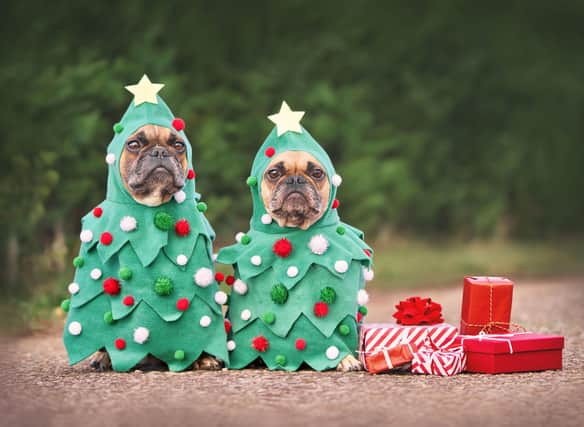Christmas is fast approaching, and it’s set to be the most wonderful time of the year for many families around the UK. But the festive season can pose a few additional problems for our dogs, and the change of routine and new experiences can be worrying to pups.
It’s estimated that six out of 10 households now include a canine companion, so dog welfare charity Dogs Trust has issued its top ten tips so the nation’s dogs can enjoy Christmas too.
Jenna Kiddie, Head of Canine Behaviour at Dogs Trust, explained: "As a nation of dog lovers, our four-legged friends will be a big part of Christmas for many families across the UK. But with unexpected visitors, a change to routine and endless food temptations, our canine companions can find Christmas unsettling and stressful. By following a few simple guidelines, you can make sure that your dog is kept safe and will enjoy Christmas as much as the rest of the family. The team at Dogs Trust would like to wish all our supporters and, of course, the nation’s dogs, a very Merry Christmas and a Happy New Year.”
Here’s the crucial festive advice.
Jenna Kiddie, Head of Canine Behaviour at Dogs Trust, explained: "As a nation of dog lovers, our four-legged friends will be a big part of Christmas for many families across the UK. But with unexpected visitors, a change to routine and endless food temptations, our canine companions can find Christmas unsettling and stressful. By following a few simple guidelines, you can make sure that your dog is kept safe and will enjoy Christmas as much as the rest of the family. The team at Dogs Trust would like to wish all our supporters and, of course, the nation’s dogs, a very Merry Christmas and a Happy New Year.”

5. Skip the fancy dress
It might look fun putting a dog in festive fancy dress but while dogs may not feel embarrassed (as far as we know!) they can feel discomfort and irritation, or they may overheat or feel restricted. Instead, why not opt for a festive collar and lead, or a fancy neckerchief and leave the party hats and Christmas jumpers for your family and friends! Photo: Canva/Getty Images

6. Know what foods to avoid
Most of us like to indulge over Christmas, but there are some foods that are toxic for dogs. As well as Christmas chocolates (don’t forget the low-hanging chocolates on the tree which are easy pickings!), they should definitely not eat grapes, raisins, sultanas or foods containing them such as mince pies and Christmas puddings. Also, nuts such as Macadamia nuts along with onion, leek, garlic, and avocado are toxic for dogs as is Xylitol (aka E967 – an artificial sweetener in some sugar- free foods). Rich fatty foods and fat trimmings can also cause serious upset stomachs and cooked bones from Christmas meat can be dangerous. Enjoy the Christmas prosecco, beer and wine yourself but don’t be tempted to share with your dog; alcohol is incredibly toxic to dogs and can cause organ failure and even death. Photo: Canva/Getty Images

7. Know your plants
Holly, poinsettias and mistletoe are common plants to find in and around homes over the festive period, but all can be toxic to dogs. Keep them up high, and make sure you pick up any dropped holly or mistletoe berries. Photo: Canva/Getty Images

8. Tree tips
Although most real Christmas trees are non-toxic to dogs, dropped needles can cause stomach upsets if eaten or can get stuck in paws so make sure as many as possible are picked up. It’s not just the needles to be aware of; your dog might get confused by having a ‘tree’ in their home and could try to chew it or even urinate on it if they are used to doing this on trees outside. If you are concerned about your dog toileting on the tree avoid leaving them unsupervised. If your pooch does urinate encourage them outside to finish any business, before cleaning the area thoroughly to minimise the risk of a repeat incident! Remember, dogs learn by positive association so avoid telling your dog off as this won’t help them learn, and may cause future anxieties and behavioural problems. Photo: Canva/Getty Images

